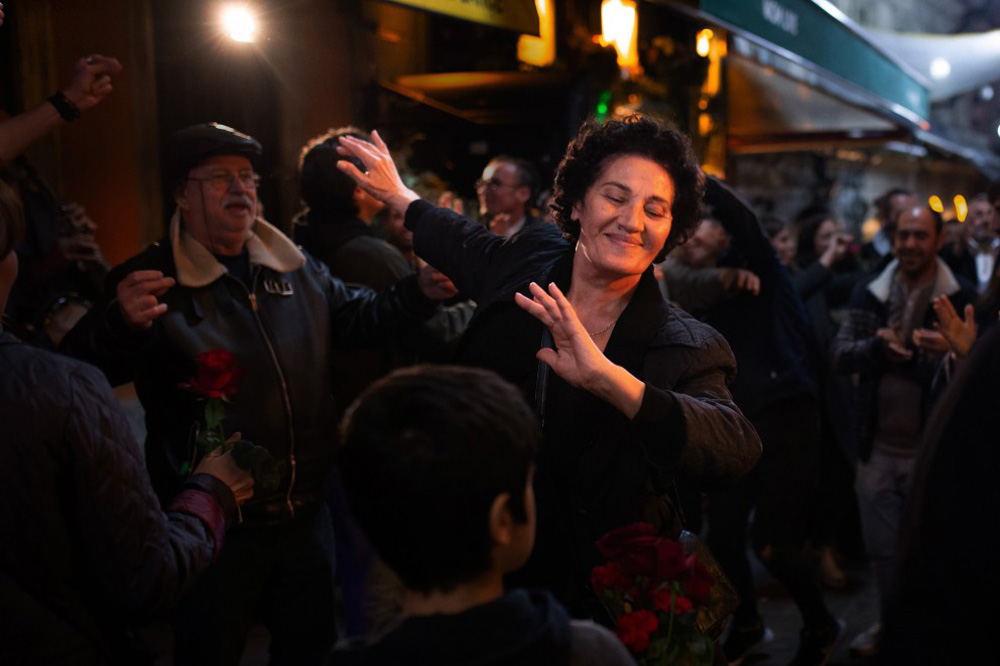Not much time is spent on where people come from in “Crossing,” with writer/director Levan Akin far more interested in the place they carve out for themselves in the world. There’s a brief set-up in the spellbinding drama on the Georgian coastal town of Batumi where a cabbie welcomes into his home his former history teacher Lia (Mzia Arabuli) while trying to kick out his younger brother Achi (Lucas Kankava), whose introduction laying about on the couch one senses is far from the first time he’s been caught there, but soon enough the two are both leaving in the morning when Achi catches wind that Lia might be on her way to Istanbul in search of her niece Tekla, whose last known residence was nearby after being kicked out of her father’s home after coming out as trans and the few clues to her current whereabouts point to Turkey. While Lia doesn’t need company, Achi could use a change of scenery and claims to speak some Turkish, which could help Lia, who might as well be wandering around in the dark in Istanbul in spite of any wisdom she’s earned by middle age.
You may think you know where the odd couple is headed, particularly after Lia sets up rules for the trip that Achi is quick to break, but as Akin shows he has something different in mind shortly after following the two into the ferry to Istanbul and having the camera drift away with one of the most impressive unbroken takes in recent memory. Whatever technical skill was involved in moving through the ship is marvelous, but more so is how it instantly connects Lia and Achi to others they’ll meet down the road in a pair of siblings, Izzett and Gulpembe, and Evrim (Deniz Dumanil), a trans woman who could know where Tekla is when the community is tight-knit. They are strangers on the ferry, but all in the same boat upon reaching the shore as outsiders because of language, gender or wealth in the case of the two young kids who play music for change, and Akin moves between their stories in such a way that any mild contrivance necessary to bring them together is easily forgivable.
The search for Tekla unites them when Achi and Lia are approached by Izzett and Gulpembe to help them, hoping for some food or shelter in return, and while she’s nowhere to be found, what does reveal itself is a kindness and compassion from nearly everyone they come into contact with, from the fellow Georgian who sits behind them at dinner and wants to pay their bill to plenty of people willing to open their doors at wrong addresses even when they speak little Turkish. This doesn’t mean “Crossing” ignores those out there who are responsible for the desperate situation the characters are in or make their lives so much more difficult than they need to be, but rather than concentrating on the attitudes that pull people apart, relegated to the stray casual remark or the rare moments anyone lets themselves speak about the past, Akin brings forward a sense of community that becomes as enrapturing to those off screen as those on it.
Arabuli is the film’s beating heart as Lia, gradually letting down a stoic facade and it’s understandable when Kankava and Dumanil, both first-time performers, prove irresistible as Achi and Evrim, respectively, two people who may not know what they want out of life yet but starting to recognize what they don’t. Lia may conclude that Istanbul is a place where you go when you want to disappear, as Tekla clearly did, but in finding the pockets around the city where people find their communities and can lead rich lives free of judgment, “Crossing” refreshingly allows its characters to be seen in full.
“Crossing” will screen at Berlinale on February 15th at 9:30 pm at Zoo Palast 2, February 16th at noon at Verti Music Hall, February 17th at 12:30 pm at Cubix 9, February 18th at 10 am at Cubix 5 and February 23rd at 4:30 pm at International.




